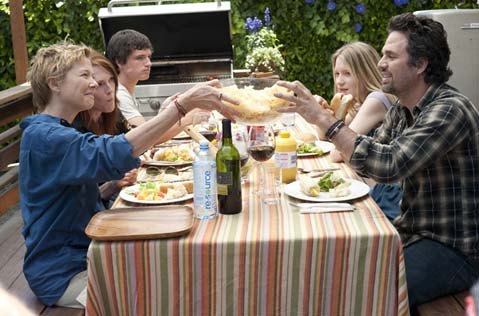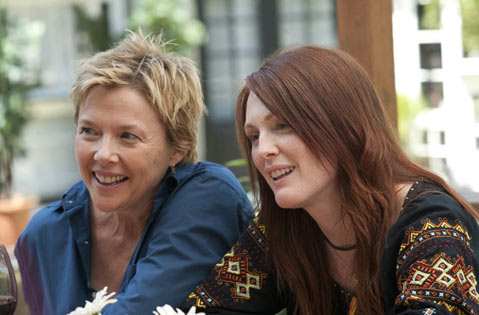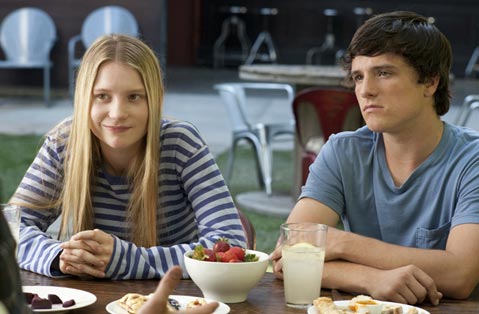The Writer/Director Is All Right
Speaking with Lisa Cholodenko, the Force Behind The Kids Are All Right

Lisa Cholodenko’s terrific, funny, and touching film The Kids Are All Right is a complicated thing. It touches many subjects, but at its center is a coming of age story about a young girl who has to come to terms with her straight, sperm-donor, biological father. Meanwhile, and perhaps ironically, she has no problems with her two moms.
Welcome to the new American family as seen through the lens of one of today’s best independent directors and supported by one of the most memorable ensemble performances, featuring Annette Bening, Julianne Moore, and Mark Ruffalo. I sat with writer/director Cholodenko recently to discuss her timely film.

U.S. District Chief Judge Vaughn R. Walker’s ruling to overturn Prop 8 has made your film timelier.
Yeah. The timing is pretty interesting.
This film is Prop 8 supporters’ biggest nightmare. When you were writing the film, your intention wasn’t to do a political film, right?
It wouldn’t be genuine to say that we weren’t well aware that there wasn’t a political vein behind it because we knew that this was a family we have never really seen on the big screen before and I think our main idea was to put it out there but let’s really subvert that.
And it’s subversive because you grab the American family we’re used to see on the screen from Ozzie & Harriet and Leave it to Beaver and re-define it. This is the New American Family.
I’ve been making short and feature films for quite a while now and gay and lesbian film festivals have always been so supportive and encouraging of me. I’ve spent a lot of time in that point of view, and so I was well aware for a long time, like 30 years or so, of gay and lesbian films that have politics on their sleeve, so to speak. I felt like that’s not where I’m at anymore, and I think the culture is really ready to see this family in a way where they don’t have to swallow the politics of it all. That was the fun of it — that it isn’t in your face in this movie, that’s it’s there, but understated, which, turns out, was our agenda.

Your film is concerned with bigger questions about family and relationships, so you intentionally suppressed the identity politics. The fact that they’re a lesbian couple is not discussed.
I find that in my own life, I don’t stand around and talk about my identity very much. I don’t think people really do that. They discuss problems with their marriage, problems with their kids, money, sex, whatever it is that is stressing people out. Obviously, people talk about coming out. But I feel adults — especially those with children — are more integrated into the world and… aren’t really having those conversations. People that don’t live certain outwardly political lives have riveting conversations that Ozzy and Harriet have, and, yeah, it’s not so different.
This film is an ensemble film, and it comes across as fresh and effortless. But the structure of an ensemble film is very hard to develop, right?
While writing it, it was one of those things where I would be angry at myself often and think, “How did I get myself into this pickle where I’ve got these five characters?” and I’m not sure how to make one of them the main character. What was key for me was to approach like there’s a main character…the family unit. Within that unit, the moms are sort of the foundation, and, within that, I had to break it down with the relationships between the moms. I don’t want to give the kids a short script, because I feel that they have to really bear on the propulsion of the storyline. So it just took a lot of trial and error and doing a bit of math, like it was a math problem. But I’m definitely just going to do a film about one person next time, just one person.
The character’s motivations are subconscious. They act the way we do in real life, doing things without truly understanding why we’re doing it. Was that hard to capture on film?
No, no. I really do feel like the directing aspect of it was really a pleasure and I think it was only a pleasure because we worked so freaking hard on the script and it really was there when we let it go as co-writers and I took it on as the director. I had a certain caliber of actor that didn’t need a whole lot of pow-wowing. They just got it. They knew what was motivating them and knew what sort of emotional underpinning of each scene was, and I needed to do very little while I was on the set to get the tone right with them. Annette Bening is tremendous and takes it all incredibly seriously. We would have script meetings before everything started, so any questions she had about motivation or feeling like the propulsion of her character was off, all those questions were worked out beforehand.
There’s not that many female auteurs in the U.S., other than Sofia Coppola and Kathryn Bigelow. Why is that? Were you happy that Bigelow won the Oscar for Best Director?
It’s hard to have a life and be a full-time director, you know? You kinda need to have a wife to be a filmmaker. You do. It’s hard when you have a kid. It’s tough to juggle it all. It’s nerve-wracking. So I think you have to have the stomach for it, the stamina for it. I think that’s one reason. I’m sure there’s a whole host of reasons that are more political in nature, and I don’t really want to into all of them. But I think it’s great that she won; I really responded to that film [The Hurt Locker] and I thought it was great.
4•1•1
The Kids Are All Right is now playing in Santa Barbara theaters.



